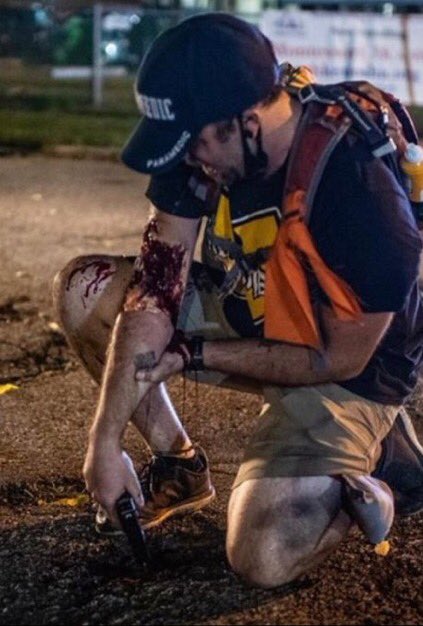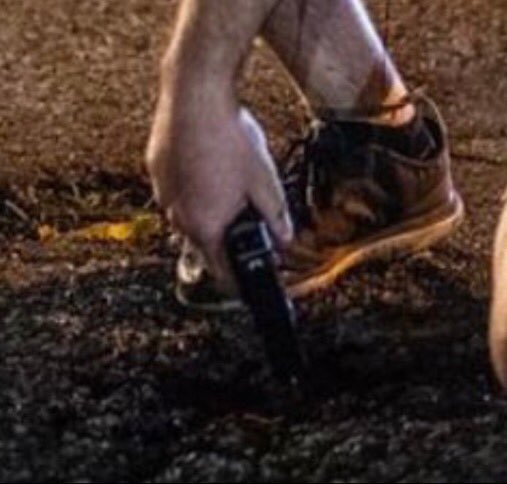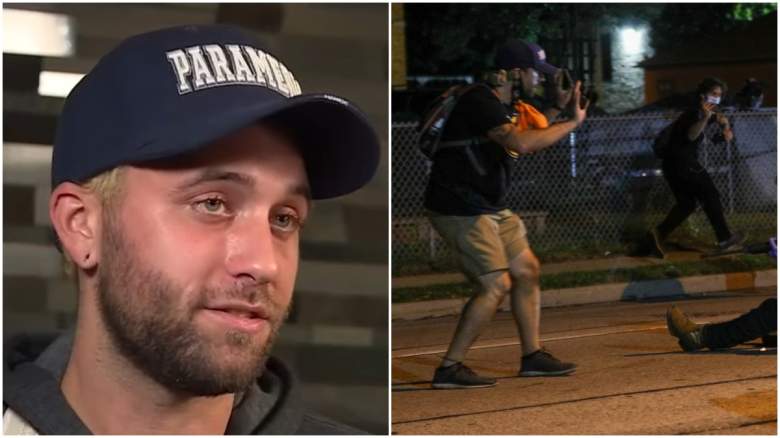
Gaige Grosskreutz is the only man shot by Kyle Rittenhouse in Kenosha, Wisconsin, who lived to tell the tale.
On the week of November 8, 2021, Grosskreutz took the witness stand in the trial of Rittenhouse, who is charged with homicide and serious felony charges in the shooting deaths of Anthony Huber and Joseph Rosenbaum and in the wounding of Grosskreutz. “I thought the defendant was an active shooter,” Grosskreutz testified, explaining why he approached Rittenhouse with a gun drawn after Rittenhouse had fallen on the street.
Kyle Rittenhouse took the witness stand himself on November 10, 2021, and he cried on the stand. Watch Rittenhouse’s emotional testimony here.
Grosskreutz appeared on Good Morning America after his testimony. In that interview, he denied pointing his gun at Rittenhouse, whom he dubbed an “active shooter.”
However, during cross-examination in the Rittenhouse trial, Grosskreutz admitted pointing a gun at Rittenhouse when Rittenhouse shot him.
“It wasn’t until you pointed your gun at him, advanced on him… that he fired, right?” defense attorney Corey Chirafisi asked Grosskreutz.
“Correct,” said Grosskreutz. He tried to claim at another point that he wasn’t intentionally pointing the gun.
Rittenhouse’s attorneys are arguing that he shot all three men in self-defense after coming to Kenosha to help protect businesses after others burned in a series of arson fires following the police shooting of Jacob Blake. The Kenosha County District Attorney later declined to charge that officer, but an assistant DA in his office is handling the Rittenhouse case, which just completed week one.
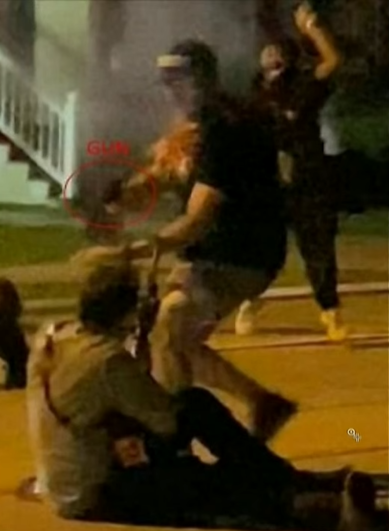
ExhibitGaige Grosskreutz in a photo presented in court. Rittenhouse is on the ground
See videos in the case here. One captures the moment Rittenhouse shot Grosskreutz.
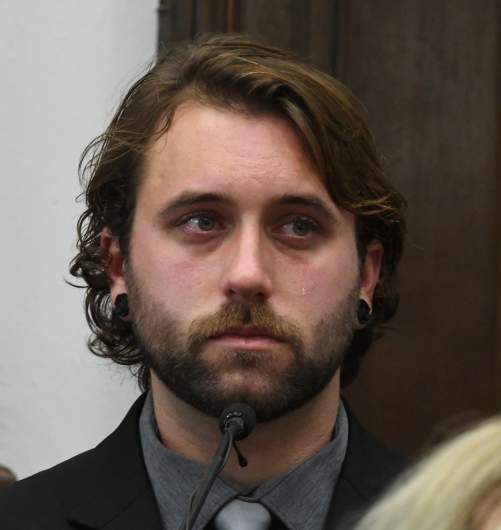
GettyGaige Grosskreutz in court.
Here’s what you need to know:
1. Grosskreutz Approached Rittenhouse With a Loaded Gun
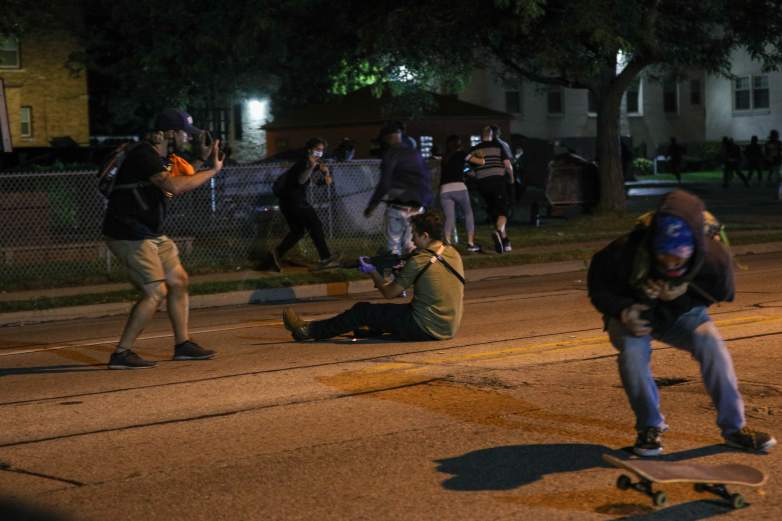
GettyIn this photo, Gaige Grosskreutz approaches Rittenhouse. Anthony Huber has already been shot at this point.
Vivid and graphic photos captured the scene that night in August 2020.
Grosskreutz was taking part in the protests/riots in Kenosha that night when Rittenhouse shot and killed Rosenbaum. Video and testimony in the trial shows that Rosenbaum was chasing Rittenhouse, cornering him near cars in a parking lot. Witness Richie McGinniss, a video editor with the Daily Caller, previously testified that Rosenbaum was lunging for, and trying to get, Rittenhouse’s gun from close proximity, when Rittenhouse shot and killed him. Rosenbaum was unarmed, but Rittenhouse’s team is trying to convince jurors that he posed a threat to Rittenhouse because he was seeking to disarm him. Prosecutors tried to establish that it was possible Rosenbaum was falling from being shot, not lunging, but McGinniss pushed back at that characterization.
After shooting Rosenbaum, Rittenhouse ran down the street, testimony says toward police, and fell. At that point, Anthony Huber rushed Rittenhouse and hit him with a skateboard and, according to photo and video evidence, touched Rittenhouse’s gun. Rittenhouse shot and killed him. That’s when Grosskreutz approached him.
During testimony, on November 8, 2021, Grosskreutz described how he heard gunshots. He thought Rittenhouse was an “active shooter.”
But this is arguably the most important moment from his testimony:
Defense attorney: “You would agree your firearm is pointed at Mr. Rittenhouse correct?”
Grosskreutz: “Yes.”
Defense: “Once your firearm is pointed at Mr. Rittenhouse, that’s when he fires his gun, yes?
Grosskreutz: “No.”
Defense: “Sir, look…Does this look like right now your arm is being shot?”
Grosskreutz: “That looks like my bicep being vaporized yes.”
Defense: “It’s being vaporized because you’re pointing a gun directly at him, yes?”
Grosskreutz: “Yes.”
Defense: “When you’re standing 3-5 feet from him with your arms up in the air he never fired. Right?”
Grosskreutz: “Correct.”
Defense: “It wasn’t until you pointed your gun at him, advanced on him with your gun, now your hands down, pointed at him, that he fired, right?”
Grosskreutz: “Correct.”
Another man had also rushed Rittenhouse before Huber moved into the scene.
Watch Grosskreutz’s testimony here.
Asked what was going through his mind, Grosskreutz testified, “that I was going to die.”
He said, “I was very close to the defendant and I thought that was a high likelihood I would be shot myself.” He said that he approached Rittenhouse with a gun and cell phone in his hands and put his hands up. He said Rittenhouse tried to fire while his hands were up but it didn’t work, so he reracked his gun.
He said he was “closing the distance between the defendant and I,” when Rittenhouse shot him. He was trying to “do something to prevent myself from being killed and shot.” He said Huber had “just tried wrestling the gun” from Rittenhouse. “I was never trying to kill the defendant,” Grosskreutz testified. “I was trying to preserve my own life.”
Under Wisconsin law, though, the legal test for self-defense is what was in Rittenhouse’s mind at that moment, not Grosskreutz’s. Rittenhouse must convince jurors he reasonably believed his life or that of another was in imminent danger or they were in danger of great bodily harm.
Asked by the prosecutor why he didn’t shoot Rittenhouse first, Grosskreutz said he is “not that kind of person.”
He did reveal that he was carrying a gun despite having an expired concealed carry permit.
On cross examination, the defense attorney said Grosskreutz that he told police his gun fell off his waist. “I don’t recall,” he said.
“That’s a lie,” said the defense attorney. Grosskreutz denied it was a lie. The defense said, “It was in your hand. You told that to multiple officers (about it falling off his waist).” Grosskreutz responded, “I don’t know.”
He said his civil lawyer was in court.
He denied he was “chasing” Rittenhouse with his gun out. But when the defense asked, of his comments to the police right after the shooting, “You omitted you ran up on him and had a Glock pistol in your hand,” and Grosskreutz said yes. He said that he had just gotten surgery and was traumatized and on paid meds. The defense pointed out he made a conscious decision not to say what he did for work. Grosskreutz said he worried for his safety.
The defense said he remembered other details in the police interview, such as what Rittenhouse was wearing. “The only information you forgot puts you with a gun directly in front of him (Rittenhouse),” said the defense attorney. Grosskreutz responded, “That is correct.”
The defense asked Grosskreutz if he filed a notice of claim seeking $10 million against the city and he said yes. He said that he never mentioned in that document “that you possessed a firearm.” Grosskreutz responded, “That’s correct.” The defense said it’s illegal in Wisconsin to carry a gun concealed without a valid permit, but that he was never charged with a crime. Grosskreutz did not dispute that.
The defense showed a photo of Grosskreutz reaching into the back of his waistband, where he initially had his gun. But Grosskreutz also admitted on cross that he feared for Kyle Rittenhouse’s safety.
The defense asked, “You believe he’s in physical danger because he’s being attacked,” of Rittenhouse. “Yes,” said Grosskreutz, who said he believed Rittenhouse was in danger of being seriously hurt.
On Sept. 24, 2020, Grosskreutz admitted he declined to answer police questions on the advice of his lawyer. He was asked for permission to look through his phone. He said he never gave him permission to look through his phone.
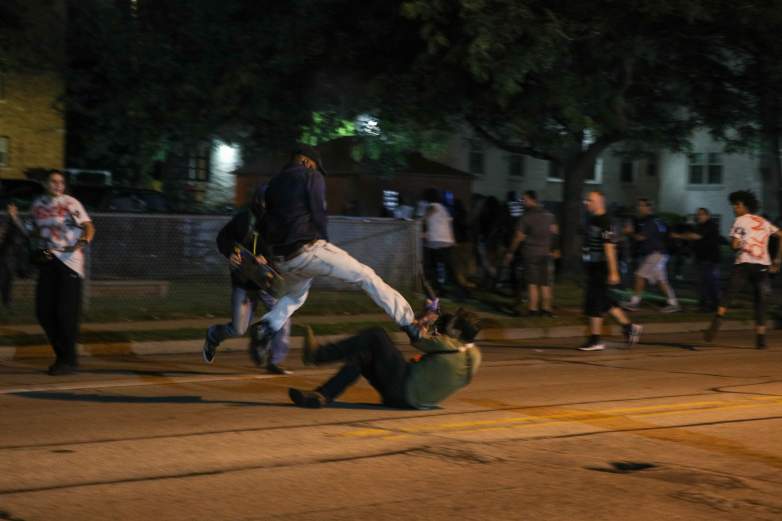
GettyAn unidentified man jumps over Rittenhouse.
Rittenhouse then ran down the street in the direction of police. At that point, a man rushed him and ended up jumping over him, kicking him. He shot at that still unidentified man and missed. The second man shot, Anthony Huber, then rushed Rittenhouse and struck him with a skateboard. The defense introduced a photo in court that they say shows Huber touching Rittenhouse’s gun.
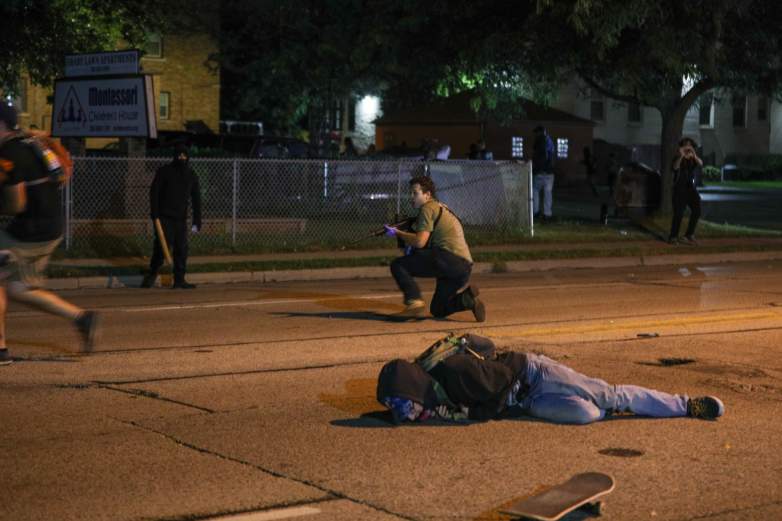
GettyKenosha shooting
Enter Gaige Grosskreutz to the scene. He then moved toward Rittenhouse, put his hands up, and then moved back in the direction of Rittenhouse, while clutching a gun in one hand, the defense says and video shows. Rittenhouse then shot him.
The defense attorney said in court that Grosskreutz told police he lost his gun before the shooting; he is shown holding it in video and photos when Rittenhouse shot him. “He had a gun in his hand,” defense attorney Mark Richards said in court. He told police he was trying to stop Huber “from beating Kyle” with a skateboard, Richards contended.
What did Grosskreutz say specifically on GMA?
He appeared with his attorney Kimberley Motley. He was asked what he felt when he saw Rittenhouse break down into tears on the witness stand. Grosskreutz said, “Well I think any time you see your would-be murderer on the stand, it’s emotional.”
He said his reaction to Rittenhouse breaking down, “To me, it seemed like a child who had just gotten caught doing something he wasn’t supposed to. More upset he was caught and less upset by what he had done and what he had taken and the numerous lives he affected that night.”
Motley said it “should be recognized Mr. Rittenhouse was an active shooter. It’s important as Gaige has said that some of his testimony was extremely inconsistent. He was not I believe in imminent fear of danger for his own life. He was not threatening Mr. Rittenhouse. Mr. Rittenhouse re racked his gun with Gaige and I think that’s really important. People need to pay attention to the inconsistent statements from the active shooter or the defendant, Kyle Rittenhouse.”
Grosskreutz said: “There are a million things that run through your mind when someone’s pointing a rifle at you after just having murdered someone. I was concerned for my safety. I’m not somebody who takes a life, I’ve made a life out of protecting and preserving life.”
Asked why he pointed his gun at Rittenhouse he referenced the Second Amendment, “right of American citizens to bear arms. And I think that during cross examination, it’s hard to say what you want to say; I do believe that in that photo given the right narrative, um, one could suggest that yes I was pointing my weapon at the defendant, um, but when you play it as a movie or look at it different stills, my arm was being vaporized as I was allegedly pointing my weapon at the defendant. It’s completely inconsistent with the physiology of my wound that he would have shot me while my weapon was pointed at his head.”
Host Michael Strahan asked, “You’re saying you weren’t pointing your gun at him?
“That’s absolutely what I’m saying yes,” said Grosskreutz. “Kyle Rittenhouse was an active shooter. He murdered two men and he attempted to murder me.”
2. Grosskreutz Has a Prior Gun Offense
It was widely, and falsely, reported on social media that Gaige Grosskreutz is a felon. He was convicted of a felony, but the felony was expunged.
He does, however, have a prior misdemeanor conviction for intoxicated use of a firearm in Wisconsin, online records show. He received probation in that 2015 case, records reveal.
His arrest and case history from the state Department of Justice is much longer than what you can currently find through online court records. It shows a string of dismissed cases and an expunged felony conviction from Waukesha County, Wisconsin.
In January 2021, he was accused of second-offense drunk driving, but the case was dismissed on a prosecutor’s motion.
You can read the criminal complaint in his second OWI case here.
It was dismissed after he alleged the arrest stemmed from an unlawful traffic stop. You can read his motion to suppress the evidence here.
He was found guilty of a 2019 forfeiture for obedience to officers and loud noises in Ashland, Wisconsin.
A police report in West Allis, Wisconsin, accused him of “lurking” in an area where police in that suburban Milwaukee community keep their private vehicles, videotaping them. Heavy contacted West Allis municipal court to get the disposition of that ticket. He was found guilty of loitering after pleading no contest on Nov. 3, 2021, they said. Here is the court record.
That information was obtained through an open records request. Here’s part of the police report:

West Allis PDPart of the Gaige Grosskreutz police report
“Gaige had no reasons to be there and had no vehicle in the lot. He was previously detained for prowling in the same area and released,” the report says in the prowling case. “Gaige appeared to be video taping personal vehicles in the rear police parking lot. Gaige made clear his anti law enforcement views. Gaige was arrested for prowling, booked, cited and released.”
Grosskreutz testified that he has one prior criminal offense. He also admitted during testimony that his concealed carry permit was expired, making it unlawful for him to carry concealed, but he had his gun stuck in the back waistband of his pants much of the night.
3. Grosskreutz’s Gun had a Bullet in the Chamber; He Is Affiliated With a Protest Group Called the People’s Revolution & Is a Medic
Testimony in court has indicated the gun was loaded. Jason Lackowski, a Marine veteran who went to Kenosha to protect businesses, testified that he picked up Grosskreutz’s gun after the shooting and found that it had a bullet in the chamber.
Grosskreutz was photographed with an arm injury from the shooting.
“In your training and experience, was that gun ready to be fired?” a Rittenhouse defense attorney asked Lackowski of Grosskreutz’s gun.
“Yes,” Lackowski replied. He said he emptied the chamber and helped apply a tourniquet to the wounded Grosskreutz.
Grosskreutz has been affiliated with the People’s Revolution protest group, according to the Chicago Sun-Times. That group was involved in the physical attack of a police officer named Joseph Mensah at his girlfriend’s home in Wauwatosa, leading to felony charges, but Grosskreutz was not alleged to be at that scene. Grosskreutz, of West Allis, a suburb of Milwaukee, Wisconsin, was 26 years old at the time of the shooting.
Asked if he was a member of the People’s Revolution, he said “no, I am not.” Have you made statements like “long live the revolution,” he was asked by the defense attorney. He said he has “affiliation, yes,” and that some of the People’s Revolution members were in the crowd that day.
The Chicago Tribune reported that Grosskreutz is certified as an EMT describing him as “a trained paramedic from suburban Milwaukee” who “had traveled to Kenosha to provide medical assistance to people protesting the shooting of Jacob Blake.” Rittenhouse was also acting as a medic that night, although he was not a certified EMT at age 17. He did work as a lifeguard.
The Tribune reported that Grosskreutz “provided first aid to people injured during the demonstrations.”
During testimony, a police officer testified that police chose not to search Grosskreutz’ phone even though they had a search warrant to do so because of Marsy’s Law, which is victims’ rights legislation. He also testified that Grosskreutz indicated he didn’t have the gun. They also did not record their interview with him.
“Why’d you shoot him,” Rittenhouse is asked as Gaige Grosskreutz runs along side him in video played by the prosecution in court. His Facebook cover photo says Reflect & Resist and he told a comment writer he was “not a hero.”
Grosskreutz testified that he was a legal observer for the American Civil Liberties Union that night and was live streaming the events. He also testified that he had gone to Kenosha as a medic and didn’t know Rosenbaum or Rittenhouse before the shooting. He had seen Rittenhouse trying to help a wounded protester earlier in the night. He didn’t arrive in Kenosha until 7 p.m.
4. Grosskreutz, Who Lost 90% of His Right Bicep, Is Suing Kenosha
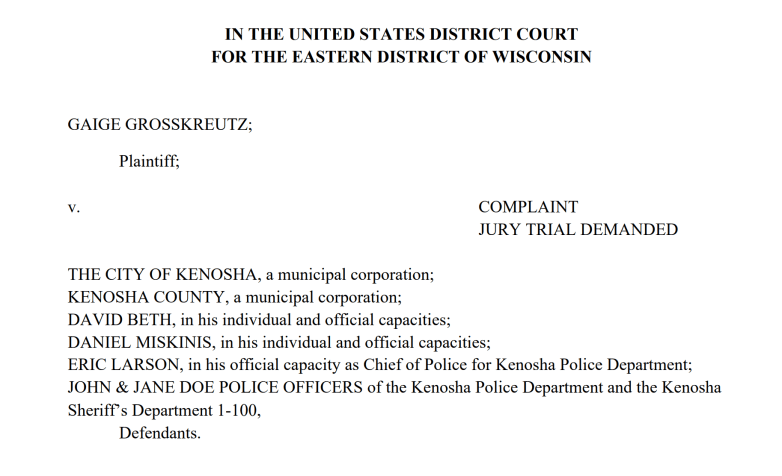
PACER
According to the court records retrieved through Pacer, Grosskreutz has filed a federal lawsuit that alleges police wrongly allowed an armed militia to imperil his safety.
However, Rittenhouse’s defense attorney denies he was part of an organized militia, saying in court that Rittenhouse didn’t know most of the other men who were present in Kenosha that day.
“It was not a mistake that Kyle Rittenhouse would kill two people and maim a third on that evening. It was a natural consequence of the actions of the Kenosha Police Department and Kenosha Sherriff’s office in deputizing a roving militia to ‘protect property’ and ‘assist in maintaining order,'” the suit says.
The suit alleges: “Seeing this murder (of Huber), Gaige Grosskreutz approached a still seated Rittenhouse. Grosskreutz put his hands in the air in an effort to show that he was not attacking Rittenhouse. Rittenhouse instead shot at him, thankfully missing his head and central mass but unfortunately striking Grosskreutz in the arm. Grosskreutz sustained serious injuries and lost 90% of his right bicep. As a true medic and not someone running around with an AR15 claiming to be a medic, Grosskreutz had a tourniquet in his medic bag. But for his training as an EMT, Grosskreutz would have likely been Rittenhouse’s third killing. Nonetheless, Grosskreutz’s life has been changed immeasurably.”
Rittenhouse’s lawyer said in court that Grosskreutz moved back toward Rittenhouse after putting his hands up and before Rittenhouse shot him.
Grosskreutz testified that Rittenhouse ran by him after shooting Rosenbaum and he heard him say, “I’m going to the police. I didn’t do anything.” He initially thought Rittenhouse said, “I’m working with the police. I didn’t do anything.” He said that he had interviewed a combat veteran named Ryan Balch earlier in the night who claimed that police told him they were going to push the protesters down the street and out of the park and that there was “sort of a plan with the police” between what Grosskreutz described as “self-proclaimed militia members” and authorities.
5. Grosskreutz Described It All as ‘a Lot to Process’
Grosskreutz resurfaced at other protest marches following the shooting, and friends told WTMJ-TV he acted as a medic at protests.
“Words are difficult right now, it’s a lot to process,” Grosskreutz said to the television station. “At no point, regardless of the topic, whether you are for or against the topic that is being protested, nobody should fear for their safety,” Grosskreutz said. “Nobody. Regardless of your opinions. Nobody should lose their life over voicing their opinion.”
In another interview, he said he started his EMT training in 2012 and worked as a pandemic. He said he thought he was “helping people in the community…people are hurting.” He said he wanted to “amplify by brothers’ and sisters’ voices.”
He added: “In Kenosha it was different… it felt like a war zone. There’s militarized weapons everywhere
In another interview, Grosskreutz said he went to Kenosha to protest as well as act as a medic. “This has not been easy emotionally or physically,” he said, adding that he is in “excruciating pain that doesn’t go away. In my arm and in my heart.”
READ NEXT: OnlyFans Model Accused of Stabbing Boyfriend
